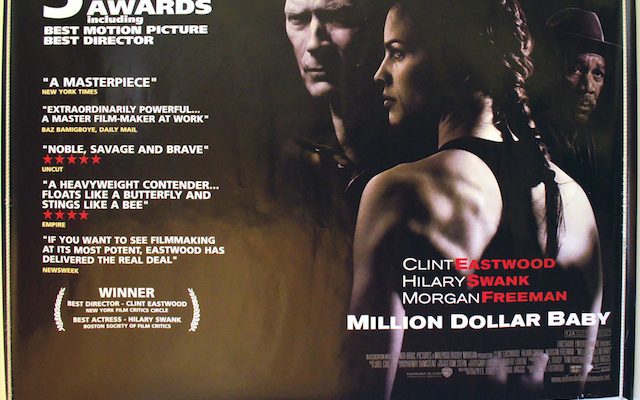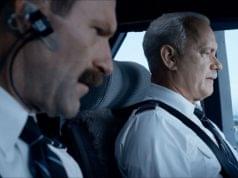
When The Artist won the Oscar for Best Picture a few weeks ago, the divided reaction among commentators reminded me that there hadn’t been this many people upset by a Best Picture win since … well, since last year, when it was The King’s Speech. Or the year before that, when it was The Hurt Locker. Or Slumdog Millionaire. Or Crash. Or Chicago. Or American Beauty. Or … you get the idea. It’s rare that the movie declared by the Academy to be the best of the year is viewed with anything approaching a consensus by the people who pay attention to such things. There’s always a faction, and often a very large one, that strenuously disagrees.
Such was the case with Million Dollar Baby, which won the prize for Best Picture of 2004, with additional Oscars for Clint Eastwood’s direction and Hilary Swank and Morgan Freeman’s performances. Though the movie had opened, in mid-December, to overwhelmingly positive reviews — it has a Rotten Tomatoes score of 92% — there had been a backlash that was actually pretty similar to the one The Artist got. People weren’t saying it was bad (for the most part), just that it didn’t deserve to win Best Picture.
A much smaller minority of critics were actually saying that it was a bad movie. I wasn’t among them, but I was aware of their existence. Some of the negative reviews were specifically on moral grounds (no spoilers, but if you’ve seen the movie you know what the topic is) rather than artistic ones, a viewpoint championed by such stalwarts as Rush Limbaugh and Michael Medved. Other critiques called the movie manipulative, phony, and cliched. Some people really, really didn’t like this movie.
What I said then:
“I see maybe two or three films in a year that affect me like Million Dollar Baby did. They are the films that I enjoy as I watch them, but that I become positively rapturous about later, as it all sinks in and I process everything…. This is the 21st time that Clint Eastwood has directed himself in a movie, and it’s some of his most nuanced, delicate work on either side of the camera…. [The film] nudges up against every cliche in the book without ever actually using them…. Eastwood keeps a steady hand, allowing sentimentality to seep in only when it’s appropriate, and even then only at a comfortable level…. He simply tells the story in a warm, kindly manner, like an expert artisan methodically going about his craft…. The boxing-as-life metaphors that have permeated a thousand other stories never felt as true as they do in this beautiful, understated film. It is destined to become a classic.” Grade: A [My complete review.]
Ugh, “destined to become a classic” again. Never say that!
I still remember the experience of watching the movie, though. It had opened in New York and Los Angeles on Dec. 17, and I saw it in L.A. when I was home for Christmas. As reflected in my review, the more I thought about it afterward, the more it affected me. I had no idea going in that the story would turn from boxing to another topic in the last half-hour, and I found it achingly tragic. Would I have called it the best film of 2004? Nah. But I did love it.
(Look, there’s no sense trying to hide it. I called Spider-Man 2 the best movie of 2004. That’s a conversation for another day.)
In preparation for this article, I looked at the negative reviews linked at Rotten Tomatoes. I noticed a curious fact. Of the 19 “Rottens” posted, 16 of them didn’t appear until the movie went into wider release in January 2005 — after the initial deluge of “Fresh” ratings. What’s more, several of these negative reviews specifically mention the positive ones.
“It’s strange that so many have mistaken its dull sincerity for something profound and moving,” wrote Josh Bell in Las Vegas Weekly.
“Have any of the critics praising Million Dollar Baby actually ever seen another movie — any movie?” asked Charles Taylor of Salon, like a condescending bastard. (Other movies with 90% or higher Tomato scores that Taylor didn’t like include Sideways, Vera Drake, Catch Me If You Can, and my beloved Spider-Man 2!!)
Andrew Sarris, in The New York Observer, was more polite about it: “I intend to explain why — unlike my esteemed colleagues — I don’t share their enthusiasm for this film.”
“A thematically inconsistent and dramatically unsatisfying false idol that has been strangely elevated to the level of Clint Eastwood’s actual masterpieces,” wrote Nick Rogers in the State Journal-Register (now behind a paywall).
“After last year’s wildly over-praised Mystic River, Eastwood delivers another sucker punch, and reeling critics have fallen for it again,” said Thomas Delapa in Boulder Weekly.
My friend James Rocchi was a film critic for Netflix at the time (yes, Netflix used to have a critic on staff), and while the site doesn’t archive Rocchi’s old stuff, I found it reposted here. It ends with this: “There’s really no reason to see Million Dollar Baby — unless, of course, you want a crash-course reminder in just how low mainstream Hollywood is willing to sink in order to get a better grip on the heartstrings of maudlin mainstream movie critics and easily led Oscar voters.”
It’s hard to read that kind of invective without wondering whether those critics would have disliked the movie as much if so many other critics hadn’t liked it so much. If it’s possible for someone who tries to be unbiased to get “caught up in the hype,” surely it’s just as possible for someone to be caught up in the backlash.
The re-viewing:
The second time around, more than seven years after the first viewing, I was charmed again by the movie’s simple, homespun feel. It starts with a small group of important characters and gradually becomes even narrower, finally resting on just Eastwood and Swank. It’s over two hours long, but not “epic” in any sense. It feels like a small, quiet story. Maybe that’s why my protective instincts kick in.
Eastwood’s detractors call his movies vanilla, bland, devoid of personality. I’ve felt that way about some of them, but Million Dollar Baby feels to me like the positive version of those qualities: unpretentious, not showy, unassuming. There’s a fine line between formulaic and pleasantly familiar, between simple and simple-minded. The location of that line differs from person to person and from movie to movie.
But I did cringe at some elements that seemed like oversimplifications. Jay Baruchel’s character, a would-be boxer named Danger, is comically stupid, far beyond the realm of plausibility. In a similar vein, Maggie’s white-trash mother (played by the wonderful Margo Martindale) is too one-dimensionally sinister. And as much as I like Morgan Freeman, and as much as I fell for his triumphant moment the first time I saw the movie, the second time through I thought that entire subplot didn’t even need to be there.
I also noticed the tidy way the film is portioned out. At the 45-minute mark is when Frankie finally decides he’ll train Maggie. After another 47 minutes is when The Tragic Incident occurs. Then it’s 20 more minutes before the first suggestion of The Controversial Way of Dealing with the Tragic Incident, and 20 minutes from there to the end. That’s 45, 47, 20, and 20, a comfortable pattern that resembles the way most network TV dramas are structured (in proportion if not in actual length). Million Dollar Baby has the same “comfort food” feeling, enhanced by the poignance of the last 40 minutes.
Do I still love this movie?
Pretty much, yeah. Some of the story’s impact is lessened when you already know what’s going to happen, and I recognize that the film has elements that are overly simple. But it still works for me. The film may not be brilliantly artful or subtle, but it’s workmanlike and humane. It’s a movie with a tender heart. Grade: B+
— Film.com




